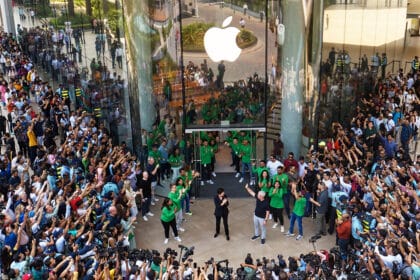According to the Goldman Sachs CEO, the Apple account the large bank powers does not compete directly with Marcus and may not pose any problems.
Goldman Sachs (NYSE: GS) chief executive officer David Solomon has said Apple’s new Savings account is no cause for concern and will not upend Goldman’s offerings. On Tuesday, Solomon said he doesn’t think the Apple (NASDAQ: AAPL) account will eclipse Goldman Sachs’ Marcus accounts.
Goldman released earnings figures for Q1 2023 on Tuesday. Speaking during the company earnings call, Solomon assured that the firm had considered potential problems from customers using Marcus and Apple’s offerings since Goldman Sachs is Apple’s financial partner on their new Savings account. However, the CEO assured that Goldman would keep its eyes out for any problems.
“We’ve obviously worked very closely at the overlap between who holds credit cards and who has a Marcus deposit, and that overlap is small. But we’ll obviously watch closely to see whether or not there’s any cannibalization.”
Apple Savings Account via Goldman Sachs
Apple announced a new savings account on Monday in partnership with Goldman Sachs. The tech giant said Apple Card users can use the accounts to save money and grow daily cash rewards while enjoying attractive benefits. For instance, the new account offers a 4.15% annual percentage yield. Also, users have no restrictions with minimum deposits or balance requirements. Apple users can start enjoying these benefits from their existing Apple Wallets.
Apple’s new savings program offers an interest rate 10 times the country’s national average. Benefits also extend to earnings as there is no limit on daily rewards. According to vice president of Apple Pay and Apple Wallet Jennifer Bailey, the goal is simple. Apple wants to help users “lead healthier financial lives.” Launching this offering allows users to save Daily Cash, send, and spend money from one source. The Apple announcement specifies that users who set up the Savings account will immediately begin receiving Daily Cash rewards.
US Banks Lose Deposits
The Apple Savings account partnership with Goldman Sachs comes as banks reportedly lose money in large numbers. According to a recent report, data from the Federal Reserve shows that depositors removed $126 billion from several banks in the week that ended March 22. The report also specified that on a seasonally adjusted basis, the country’s 25 largest banks were drained of $90 billion.
Interestingly, smaller banks had suffered a similar fate following problems caused by the collapse of Signature Bank and Silicon Valley Bank. During the week that ended March 15, depositors removed $120 billion from community and regional banks and deposited $67 billion in the 25 largest banks. At the time, there seemed to be more faith in the large banks and a larger disconnect between large and small banks. However, as of the week ending March 22, smaller banks were able to pull $6 billion, accounting for seasonally adjusted calculations. Nonetheless, total deposits were down 4.4% to $17.3 trillion from the same week last year. Also, this figure is the lowest recorded since July 2021.
next